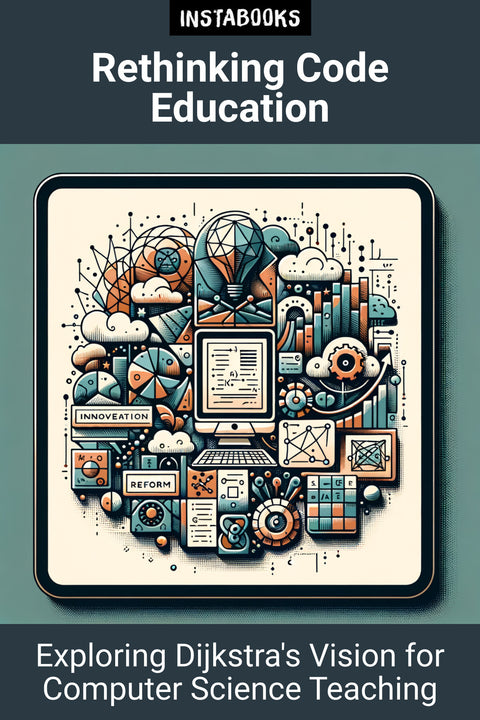
Rethinking Code Education
Exploring Dijkstra's Vision for Computer Science Teaching
Included:
✓ 200+ Page AI-Generated Book
✓ ePub eBook File — read on Kindle & Apple Books
✓ PDF Print File (Easy Printing)
✓ Word DOCX File (Easy Editing)
✓ Hi-Res Print-Ready Book Cover (No Logo Watermark)
✓ Full Commercial Use Rights — keep 100% of royalties
✓ Publish under your own Author Name
✓ Sell on Amazon KDP, IngramSpark, Lulu, Blurb & Gumroad to millions of readers worldwide
Introduction to a Paradigm Shift in Computer Science Education
The landscape of computer science education is a rapidly evolving field, influenced by thought leaders and pioneering thinkers like Edsger W. Dijkstra. His controversial 1988 work, 'On the Cruelty of Really Teaching Computing Science,' challenges the very foundations of how we teach computer science today. This book aims to delve into Dijkstra's radical perspectives and explore their profound implications on modern educational practices.
Unveiling the Radical Novelty of Computing
Dijkstra posits that computers are a radical novelty, unlike any other previous technology. This paradigm shift reframes how educators and learners approach computer science. By dissecting this concept, the book clarifies why conventional analogical thinking might be insufficient and how this understanding compels a reevaluation of current teaching methodologies.
Critiquing Traditional Teaching Methods
Moving beyond the metaphor-laden teaching approaches, Dijkstra advocates for a formalized, rigorous methodology. This section unpacks his critiques and provides a comparative analysis of traditional versus formal methods of teaching programming, offering readers compelling arguments for a curriculum reform.
Emphasizing Formal Methods in Programming
In a field where precision is paramount, Dijkstra's advocacy for formal methods and provability presents a compelling case for viewing programs as mathematical constructs. Readers will gain insights into how formal provability is essential, impacting not just educational settings but also the software engineering industry.
Proposing Educational Reforms with Hoare Logic
Breaking down Dijkstra's proposal of utilizing Hoare logic in introductory courses, this book explores the practicality and challenges of implementing such a framework. It paints a picture of a transformed educational approach that prioritizes the structural understanding of programming over mere execution, preparing students for the complexities of modern computing environments.
Influence on Contemporary Software Engineering Discussions
The final section connects Dijkstra’s ideas with contemporary software engineering curricula, showcasing how his insights have become integral to modern discussions on formal specification and validation. This fusion of thought provides both educators and practitioners with a robust framework for incorporating Dijkstra's principles into practice.
Table of Contents
1. Understanding Computers as Radical Novelties- The Concept of Radical Novelty
- Historical Context and Impact
- Challenging Analogical Thinking
2. Critiquing Conventional Teaching Methods
- Traditional Approaches
- Metaphors versus Formality
- Case Studies in Education
3. Formal Methods in Computer Science
- Mathematical Constructs
- Formal Provability
- Practical Implications
4. Introducing Hoare Logic in Education
- Understanding Hoare Logic
- Course Design Challenges
- Implementing Change
5. Educational Reforms and Challenges
- Aligning with Dijkstra
- Resistance and Adoption
- Future Prospects
6. Impact on Software Engineering Practices
- Curriculum Integration
- Industry Applications
- Evolving Discussions
7. Case Studies in Formal Education
- University Initiatives
- Formal Case Studies
- Global Perspectives
8. Theoretical Versus Practical Teaching
- Balancing Theory and Practice
- Educator Experiences
- Student Feedback
9. Formal Methods as a Teaching Tool
- Pedagogical Strategies
- Proven Benefits
- Global Implementations
10. Dijkstra’s Legacy in Modern Education
- Influential Theories
- Contemporary Dialogue
- Legacy and Inspiration
11. Adopting a Multidisciplinary Approach
- Cross-Disciplinary Techniques
- Integrating Diverse Fields
- Collaborative Successes
12. Conclusion: Rethinking Computer Science Education
- Synthesizing Insights
- Future Pathways
- Visionary Directions
AI Book Review
"⭐⭐⭐⭐⭐ Masterfully exploring Dijkstra’s groundbreaking insights, this book reshapes our understanding of computer science education. By diving deep into the radical novelty of computers and the need for formal methods, the author provides a compelling critique of traditional teaching. Readers will find themselves fascinated by the logical rigor and the proposed educational reforms, seeing the compelling influence these ideas have on today's software engineering practices. This insightful work is essential for educators and professionals looking to embrace innovation in teaching methodologies. Its engaging discussion and clear explanations ensure it stands out in the genre of educational reform."
